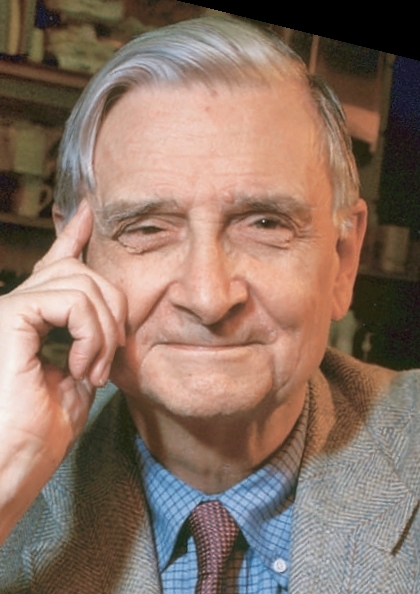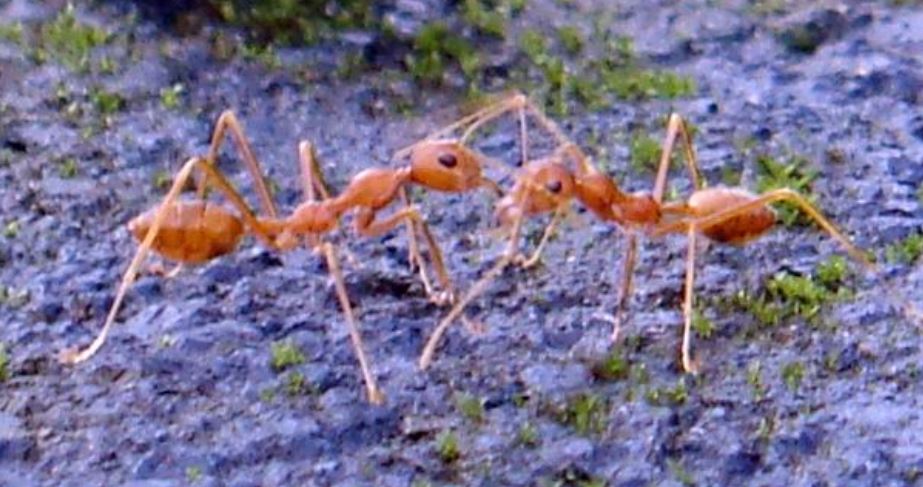Ant-Man is a popular comic book character and a blockbuster recent movie, with Paul Rudd in the starring role. But the real ant-man is a scientist who has devoted his life to the study of these humble and ubiquitous six-legged creatures. E. O. Wilson has used his knowledge of ants to create the ecological ideas that drive biodiversity conservation today.

Edward Osborne Wilson was born in Birmingham, Alabama, on June 10, 1929. He and his family moved often, and the young Wilson chose nature as his best friend. He wanted to study birds, but poor hearing in one ear and blindness in one eye (a fishing accident) meant he didn’t have the acute senses needed for ornithology. So, he turned to insects, noting that “Most children have a bug period. I near grew out of mine.”
Wilson’s specialty was—and is—ants. He is the world’s expert on ants, from taxonomy (he has named hundreds of new species) to behavior. While in high school in Decatur, Alabama, he studied the ants of Alabama and was the first to report the presence of fire ants in the United States. He studied at the University of Alabama (B.S. and M.S.) and Harvard, earning his Ph.D. in 1955. The next year he was appointed to the Harvard faculty, where he remained for his entire career, officially retiring in 1997. He studied ants across the world, mainly in the South Pacific and the American tropics.

His decision to study ants was providential. “Ants are always there,” he said, “and that has given me an edge. I’ve ridden ants the whole way.” Ants led him to several important discoveries. First, he revealed that ants communicated largely through chemicals that he called pheromones; his work launched the field of chemical ecology. Then, studying ant diversity on islands, he developed the theory of island biogeography (with colleague Robert MacArthur); that theory has become one of the bedrock ideas and strategies of biodiversity conservation. He then concentrated on ant behavior, recognizing in their complex social organization the similarity to human communities. From those studies came a series of books exploring social behavior in humans, including his seminal text, Sociobiology. He introduced the concept of “biophilia,” the need for humans to maintain contact with nature. Many of his ideas on human behavior were initially disparaged, but most have survived decades of scrutiny to become now standard tenets of behavioral biology and psychology.
His understanding of the importance of ants in tropical ecosystems led to his fundamental concern for preserving biodiversity. “Biological diversity—‘biodiversity’ in the new parlance—is the key to the maintenance of the world as we know it,” he wrote. “Life in a local site struck down by a passing storm springs back quickly because enough diversity still exists.” He has lavished attention recently on the Mozambique island ecosystem of Gorongosa, one of the most biodiverse landscapes on earth and a place where public-private partnerships are protecting and restoring the ecosystem. He argues today for a concept called “half-earth,” protecting half of the globe in parks and preserves—another new idea for a man and a mind that won’t quit.
By any standards, E. O. Wilson is among the greatest living scientists and conservationists in the world. He has written 20 books, received more than 150 major awards (including two Pulitzer Prizes for his books), and been named one of the most influential people of the century. He remains optimistic that an enlightened human species can and will protect the earth. His understanding of animal behavior gives him confidence that humans will grow to appreciate what is truly valuable in the world: “Destroying rainforest for economic gain is like burning a Renaissance painting to cook a meal.”
References:
E. O. Wilson Biodiversity Foundation. E. O. Wilson. Available at: https://eowilsonfoundation.org/e-o-wilson/. Accessed February 21, 2020.
French, Howard W. 2011. E. O. Wilson’s Theory of Everything. The Atlantic, November 2011. Available at: https://www.theatlantic.com/magazine/archive/2011/11/e-o-wilsons-theory-of-everything/308686/. Accessed February 21, 2020.
Ruse, Michael. Edward O. Wilson, American Biologist. Encyclopedia Britannica. Available at: https://www.britannica.com/biography/Edward-O-Wilson. Accessed February 21, 2020.
Wilson, E. O. 1992. The Diversity of Life. Harvard University Press, Cambridge, Massachusetts. 424 pages.
